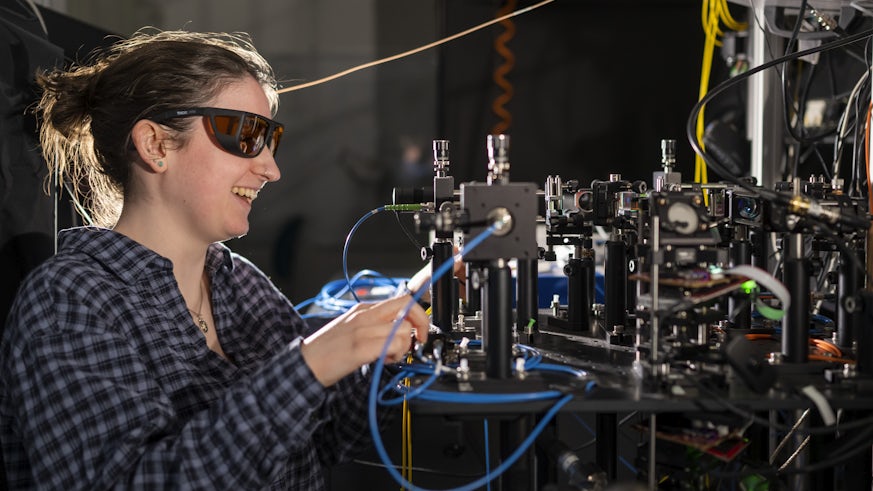Cardiff receives share of £1 billion doctoral training investment
14 March 2024

Cardiff University will lead one of 65 new centres for doctoral training (CDT) established to support research in areas of national importance including artificial intelligence (AI), quantum technologies, semiconductors, telecoms and engineering biology.
The UK’s biggest-ever investment in engineering and physical sciences doctoral skills totals more than £1 billion, and was announced today by Science, Innovation and Technology Secretary Michelle Donelan.
The CDT in Compound Semiconductor Manufacturing led by Cardiff University will conduct research to improve the design, manufacture and environmental sustainability of semiconductors crucial to current and future technologies such as high-capacity telecommunications and the next generation of electric vehicles.
Professor Peter Smowton, Managing Director at Cardiff University’s Institute for Compound Semiconductors, will lead the CDT. He said: “CS materials are a key enabling technology at the heart of modern society, transforming energy efficiency. They are core to the development of, for example, the 6G network, sensors for autonomous vehicles, the internet of things, future energy efficient lighting, satellite communications and new imaging techniques. Simply put, these technologies support our connected world, our health, our security and the environment.

The next phase of our CDT will provide the step change in CS manufacturing necessary to achieve the next generation technologies and also focus on embedding energy and resource efficiency into these manufacturing processes.
Watch a video about the Institute of Compound Semiconductors Clean Room on YouTube
Welsh Secretary David TC Davies added: “I’m delighted that the UK Government is backing Cardiff University’s Institute for Compound Semiconductors with this funding. Our leading compound semiconductor cluster in South Wales is at the forefront of technology which is so vital for our modern connected world. The investment will enable researchers to push the boundaries even further as this technology develops.”
Cardiff University researchers from the School of Engineering will also lend their support to the centre for doctoral training in net zero aviation.
Led by Cranfield University, in collaboration with Cardiff University, the University of Strathclyde, the National Centre for Atmospheric Science and delivered in partnership with industry, it will train 64 students and drive research into novel, disruptive solutions that will decarbonise aviation.
The centre will help deliver the UK’s Jet Zero and the Aerospace Technology Institute’s Destination Zero strategies and help establish the UK as an international hub for technology, innovation and education for net zero aviation.
Professor Carol Featherston of Cardiff University’s School of Engineering said: “Decarbonising aviation is a significant challenge against which progress must be made apace over the coming decades."

We’re looking forward to working with colleagues across the sector to train the next generation of engineers who will help develop the technologies required in the aviation industry and meet government ambitions for Jet Zero.
Research theme leader – Sustainable Transport
Collectively, the CDT’s represent a £500 million UK Research and Innovation (UKRI) and Ministry of Defence investment plus a further £590 million from universities and business partners.
They will train more than 4,000 doctoral students over the next nine years, building on the Engineering and Physical Sciences Research Council’s (EPSRC) long-standing record of sustained support for doctoral training.
Professor Charlotte Deane, Executive Chair of the EPSRC, added: “The Centres for Doctoral Training announced today will help to prepare the next generation of researchers, specialists and industry experts across a wide range of sectors and industries.
“Spanning locations across the UK and a wide range of disciplines, the new centres are a vivid illustration of the UK’s depth of expertise and potential, which will help us to tackle large-scale, complex challenges and benefit society and the economy.
“The high calibre of both the new centres and applicants is a testament to the abundance of research excellence across the UK, and EPSRC’s role as part of UKRI is to invest in this excellence to advance knowledge and deliver a sustainable, resilient and prosperous nation.”
Share this story
The institute provides cutting-edge facilities to help researchers and industry work together.



